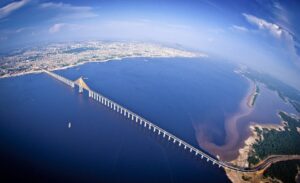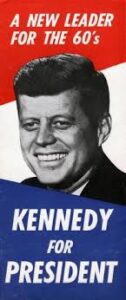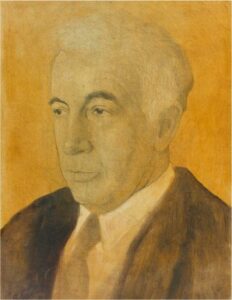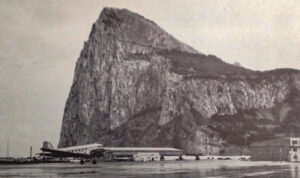Just before we left Manaus, I told the driver to stop so that I could purchase an Amazonas flag. It was full sized. Flags interest me because they have meaning and the Amazonas flag is no exception. The flag has a central red band enclosed by white bands, representing hope. In the corner is a blue quadrant representing the sky; stars represent the Amazonas municipalities with Manaus as the central big star. The red band represents what Manaus must do – overcome difficulties.
Manaus – poor Manaus – a place neglected – a country defiled. Virus ridden, unable to cope.
So different from the cheery countenance when we visited Manaus. It was winter 2019. We had arrived early in the morning on a flight from Rio de Janeiro via São Paulo; the flight had taken us the best part of five hours. When you are in a cramped space, time becomes either something to be ignored or to drive one mad by looking at one’s watch, constantly nagged by “are we there yet?” But the bed, once reached, compensated.
Yet although we spent most of the time on the Amazon, the bookend times were in Manaus, the port where we boarded the cruise ship. We arrived after one in the morning in this old hotel which was in a narrow street littered with graffiti. There were signs of it being left to its own devices, with a few mango and banana trees thrown in to give it tropical colour.
It was a late breakfast highlighted by the best ceviche I have tasted. White fish, normally an enemy of my gut, was succulent, with the various additions centring around the lime juice marinade it was perfect.
The only problem was that I thought I had lost my wallet, and the room was turned upside down by long suffering staff, until I found it nestling in my documentation. My companion just looked at the ceiling.

The transfer to the boat soon after midday and then on return only a day before we were scheduled for a late afternoon flight meant we saw very little of Manaus. The opera house and many of the old buildings reflected the heyday wealth of Manaus from its then rubber monopoly; the wharf side markets, and the exotic nature of the produce reflected the present day source of wealth. Manaus was alive and the day was full, going all over the city and even crossing to the new bridge across Rio Negro to the city of Iranduba. By way of explanation, Manaus is technically on the Rio Negro, which lives up to its name – as we witnessed when this river joined up with the upper Amazon (Solimōes) River very near Manaus.

Given how much açaí fruit has penetrated our health food industry, there was a certain luxury of actually eating the fruit from this palm in Manaus, with its agradável flavour to best to describe it. However, the grapelike fruit provided a brief novel pleasure.
That was the problem, the pleasure of being in Manaus was so brief. We would have liked to have stayed a week longer; as with many of these exotic places, they seep into the cracks of one’s personality – and one is left with a feeling of nostalgia compounded by a strange sense of grief reflecting on what the city is going through now.
With all the tragedy being enacted in Amazonas, I only hope the red band in its flag burns bright with its white companions providing the hope. What else can one say, because among other matters far away in urban Brazil, the people there have bet on an unintelligent narcissist to lead them to a better life. I do pray for Manaus – and indeed for the whole of the Amazon basin.
The problem with Age
When Biden was a young man of 20, a 43 year old war veteran and Senator from Massachusetts was inaugurated President.
The Senator’s 71 year old father looked on proudly.
Now Biden is an old man; as a 78 year old he has been inaugurated as President of the United States. His 50 year old son and 40 year old daughter looked on proudly.

By the end of John Kennedy’s first year of Presidency, his father had had a profound stroke, which left him severely disabled, unable to talk. He lingered, dying, at the current age of President Biden.
John Kennedy’s election could be seen as a reaction to the ageing heroes of World War II – the fifties had seen a demented Churchill pushed into retirement, but not until he was 81, to be replaced by an ageing, ill, long term protégé-in-waiting, who miscalculated badly over Suez and in turn was replaced by another World War warrior.
Eisenhower, later in Presidency when he was nearing 70, was wracked with health problems, including a heart attack, while in Europe De Gaulle was nearing 70 and German Chancellor Adenauer was well over 80. Australia contributed the ageing Menzies who was nearing 70.
Before Kennedy arrived, it was an old man’s world.
Recently in America there has been a tendency for an old President to be replaced by a younger one. If this succession holds true, then Trump has no hope, even before his trial, even if his diet does not kill him before.
There are a couple of factors which are different now from 1961. One is that there are many more avenues for treatment of the ageing body. One area in particular has been treatment of cardiac disease. Then at Kennedy’s inauguration there were few if any coronary care units, no cardiac surgery on a regular basis, no stenting, and over all treatment of high blood pressure was far from today’s standards. Smoking was still rife. When I was an intern in the early 1960s, the treatment of a heart attack was symptomatic, namely bed rest and analgesics with digoxin and heparin if needed. However, every time I see Biden break into that arthritic jog I shudder and think of his succession.
This then other unknown is the presence of a female Vice-President. Good God, replacement by a younger woman!
I can see Vice-President Harris developing a close relationship with Prime Minister Ardern, but whom from Australia? The most obvious is Penny Wong.
Nevertheless, I would like to be there when Marise Payne rocks up to Washington. But then the Vice-President has been exposed to some of those delightful Republican women in the past, and no doubt in her own courteous way would politely call forth “A chi tocca” when she meets these Australian Republican simulacra, represented by the fruity Marise.
Australia Day

Once in 62 upon a pastured lawn The Pom called Robin Day did ask To serried ranks we stood Respectful Should we seek republic And the answer unexpected From knees once genuflected To Day we all said aye. January 26 A day of Independence When India Grew up and threw away its swaddling clothes A cope with mace and orb and sceptred scrap Lie shattered ‘pon brown flattened earth For people confused by Battenburg But now Republic Day they all say aye January 26 A day For we still caught in cream bassinet A good man stood on Botany shores Sent from porphyric hungovered king Possession gained with jack of Andrew, Patrick, and of George But no place for David, no daffodils nor leek Yet this Southern harsh and sunburnt land a dump for human waste He christened his green and pleasant New South Wales In homage we whitefellas celebrate this day January 26 Summer invasion to those not tanned To frolic in illusory freedom The Jack still flutters A cornered eye The Southern Cross is overseen. By stiffened queen To celebrate a day of smoke and sand and foaming ale Robin Day is long since dead That rank of 62 is thin and worn Who once called aye for change Yet Her of steely Albion eyes Or He of fumbling foreign voice survive Shall we now spent and grey Not live to have a true Australia day Which we can call our own A lone voice rings out Make September First Republic Day Is it not the first day of Spring Is it not when wattle bloom A sprig for all Is it but a symbol of youth and vigour This day which is The First of September
The back story of this poem was the Australian visit of Robin Day who, for many years, was the face of the BBC program “Panorama”. It was either 61 or 62. “62” in the poem is poetic licence.

Day had approached Zelman Cowan, then the Dean of Law at the University of Melbourne, to round up the usual suspects of Bright Young Australian Youth to be interviewed. It was a time when Great Britain was showing an interest in joining the European Common Market. Menzies’ Australia was opposed to this course of action. Robin Day wanted a bit of colour for a piece to show on Panorama to highlight the squabble.
Zelman asked Phil Cummins, then a prominent law student and student politician, to collect his then mates. I was part of the crowd invited, and there we were, arranged outdoors “in serried ranks” as if we had won some trophy. Day was among a caste of interviewers whose unctuous style enabled him to cleverly manipulate his interviewees in the way he wanted. He was thus working his way down the student line until his flinty eyes alit on this impeccably designer dressed tramp. He asked this young bespectacled scarecrow for his opinion on the stoush, who in response brushed aside whatever had been asked and said: “I am a republican, and you Brits can do what you like.”
Then a bloke in the front row chimed in: “I don’t like the Poms either.”
This then unleashed a number of insurrectionary comments.

From then on Mr Day found himself one out, such that in the end he was led away from the group by Dean Zelman with the words “Totally unrepresentative opinion”.
When the program was ultimately released in Australia, I saw it by chance. I had just delivered a baby as part of my student rotation at the Royal Women’s Hospital and happened to come into the student common room and there he was – Zelman Cowan wandering down one of the paths leading from the Melbourne Shrine, burbling about “the indissoluble links between Australia and the Mother Country” or some such words. Our student interview was on the cutting room floor.
Anyway, a good training run for a Governor General aspirant. After Kerr, Cowan restored a great deal of dignity to the position and ironically later in life became a republican. Pity the intervening 30 years.
As for Great Britain going into the European Union then, Menzies was just as irrelevant then as he had been during the Suez crisis in 1956; and for Great Britain then, as always, De Gaulle was la mouche dans la pommade.
The Pardoner Prologue
With this trick, I’ve earned myself a salary of about a hundred gold coins a year. I stand up there in front of the people like I’m a priest or something and preach and tell just like the kind I just mentioned. All the stupid people sit in front of me and soak up every word I say. I make a good show of it, straining my neck to look at all the people to the right and left of me, just like a bird in a barn. I gesticulate with my hands and speak quickly, which makes my speeches dramatic and fun to watch. I always preach about greed and the other deadly sins, which makes them happy to give away their money—namely, to me. I’m only in this for the money you know, not for cleansing immortal souls. Why, I don’t give a damn if their souls are as rotten as garbage when they die! Of course, I’m not the first person who’s preached with an ulterior motive either. Some priests give sermons to make people feel good about themselves so that they’ll get promoted to bishop. Others preach for love of fame or to fan the fires of hate. I only preach to make money and sometimes to get back at people who’ve said nasty things about me or my fellow pardoners. I can rail against a person in the audience to ruin his reputation, for example, and, even if I don’t mention his name, everyone will know whom I’m talking about. That’s how I get back at my enemies, by spitting out my venom under the guise of being holy and virtuous.
This is an excerpt from the Prologue from the Pardoner’s tale. One of the Canterbury pilgrims Geoffrey Chaucer recorded, each providing his fellow pilgrims with a tale to while away time as they rode towards Canterbury. The Prologue and the Pardoner’s tale itself have so much of Trump in them that if there were to be a further film made then Donald would fit the role of Pardoner.

The tale told revealed three men from Flanders, the worst sort of “jocks” in their unbridled roistering decided to confront and kill Death. They were on their way to the village where they had heard Death had killed everybody when they encountered an old man who said that Death lurked behind a certain oak tree. When they reached the tree, instead of Death they found a substantial cache of gold. Now in the time-honoured way groups of three behave, two of them plotted to kill the youngest one, thereby reducing the division of spoils to two.
In the meantime, they sent the potential victim into the village to buy provisions. However, this young man had similar views, but he wanted to reduce the three-way split to one – himself. He thus went to the apothecary bought some rat poison and put it into the wine that he had also purchased.
He then went back, and his two companions killed him, but then drank the poisoned wine. Therefore, they all ended up dead. For us, the future generation, the lesson of the tree hoard is the basis of the aphorism that greed is the root of all evil.
After the story, the Pardoner increases his sales pitch and starts flogging relics. This angers the Host who in part replies with the following:
But by the croys which that seint Eleyne fond, I wolde I hadde thy coillons in myn hond In stede of relikes or of seintuarie; Lat cutte hem of, I wol thee helpe hem carie; Thay shul be shryned in an hogges tord.
In modern terms something equivalent to having intestines for garters, but somewhat lower in the male body. Before the two descend into any rough stuff, the Knight intervenes.
Which leaves but one question, how much did Donald the Pardoner rake in from his 143 pardons. Say an average of US$10, 000 – more you say. Probably impossible to find out, anyway I wouldn’t bother looking behind any of the trees on any of his golf courses. But you never know, given that Donald is probably out to kill Death.

Hib-brawl-tar
I was reminded of a photograph which was pulled from my father’s collection when he was touring around Europe in the late 1960s. The slide was of the Rock of Gibraltar.
The Rock had always been on my “bucket list”, and I was not alone. When I used to mention that I wanted to go there, it seemed to have a romantic connotation and it was the surest way of attracting interest.
When my father saw the Rock, it was then off limits after Franco closed the border in 1969. Spain did not re-open the border until 1985, and in the meantime Great Britain built a fence on neutral ground within which it built a modern airport. Therefore, it is an interesting experience driving across the border and the runways in order to arrive in Gibraltar proper.

One thing Gibraltar knows is how to disappoint. Even though there is a polyglot population boasting an impressive heritage, Gibraltar just felt like a Butlin’s holiday camp.
The Gibraltarians have their own dialect, but most of the voices in the hotel sounded as if they were born within the sound of Bow Bells.
However, the Rock was something else. The view across the Straits of Gibraltar is spectacular, as Africa looms through the haze and the harbour is dotted with myriad shipping.
The resident monkeys on the Rock like most of their kind are more annoying than dangerous. These Barbary apes, as they are misnamed because they have no tails, are the last wild monkey population in Europe.
The other distinct aspect is the tunnels in the Rock. The tunnel network is far larger than the roads, but not unsurprising given the Rock has been a target since its acquisition by Great Britain in 1703 as a spoil during the War of Spanish Succession, legitimised by the Treaty of Utrecht eight years later.
Spain has always tried to reclaim it, by complaint or force. In response Great Britain has reinforced the defences on the Rock, most recently during World War II. We were afforded a glimpse of these tunnels, but as far back as the late 18th century, their existence reflected this animosity with Spain. The five-year siege late in that century saw the successful experimentation by the British in being able to fire on the siege ships, and a certain Lieutenant Shrapnel lent his name to an invention, which the Spanish found disconcerting. Eventually after five years the siege was lifted.
Gibraltar has picturesque reminders of its Britishness – telephone boxes and policemen in bobby hats. However, nobody mentioned the fact that our Spanish-registered rental car had been illegally if inadvertently taken into Gibraltar. But then Gibraltar for all its professed loyalty to the British flags has a dark side, the scourge of all these overseas territories still controlled by Great Britain. In a report by the European Union released in December 2019 entitled Anti-Money Laundering and Counter-Terrorist Financing Measures, the following gives a flavour to the lackadaisical way the regulations are administered by the Gibraltarians.
Gibraltar has a sound legal framework to exchange information and cooperate with its foreign counterparts in relation to money laundering (ML), associated predicate offences and financing of terrorism (FT). Nevertheless, the timeliness of the information exchange is hindered by the shortage in human resources and the lack of clear guidelines in relation to incoming Mutual Legal Assistance (MLA) requests. Legal assistance has been sought, primarily from the UK and Spain…The indicated delays in receiving replies to requests for assistance and the limited resources that law enforcement agencies have at their disposal to pursue evidence abroad impede their capacity to investigate and disrupt transnational criminal networks involved in ML, drugs trafficking and tobacco smuggling. There have been no outgoing requests related to confiscation during the review period.
… Gibraltar’s economy is primarily based on tourism, financial services, online gambling and shipping. Trade is concentrated on refined petroleum, passenger and cargo ships, cars, and recreational boats. The UK, Spain, Mauritania, Italy and the Netherlands are Gibraltar’s main trading partners.
Reading between the lines, a major activity is smuggling and generally living on the dark side of the law. Admission that Mauretania is one of the major trading partners is interesting, given that Mauretania retains the pre-eminent world position in slavery.
Gibraltar is part of that stain on the World – the United Kingdom Overseas Territories, the home of all the shenanigans which are the dark side of capitalism – tax havens being the centrepiece. However, this dark soiled hidden hand is allowed to persist since it allows Capitalism to show the other philanthropic clean hand, immaculately manicured. The current situation suits those in power, having one hidden dirty hand.
As for Gibraltar, it may as well be part of Spain if it were not for it being virtually this open slather for criminal activity, which seems to be tolerated here but wouldn’t be in either Spain or Great Britain.
Gibraltar nevertheless provides employment for 10,000 Spanish citizens who use only their ID cards to cross daily from the depressed area of Spain adjacent to the Rock in which they live.
The current situation allows Gibraltarians to live in a far cheaper place and the last minute deal between Spain and Great Britain will continue to allow Gibraltar to have closer ties with the EU as a party to the Schengen Agreement. It means that Gibraltarians can move without passport through those 28 European countries which are part of the Agreement and vice versa. This closeness to the EU is what 96 per cent of Gibraltarians wanted.
Paradoxically the British, who claim sovereignty over Gibraltar, now must present passports when they want to enter because Great Britain and the Republic of Ireland are outside the Schengen Area, but the Spanish are not.
Let’s see how long before the Gibexit. But why? Criminality thrives on chaos. Look, no passport needed.
Curiae Amici Inusiti
Mouse and I have got together and present this verbal diorama. Below are the evergreen Fauci’s comments made to NYT. Since liberation from Trump’s circus, let us say, the old boy is a wily coyote in being able to survive for 40 years in the headlights without being accused of compromising his integrity, unlike the unfortunate Deborah Birx.
The NYT interview has been published widely, but the reason for this quote is to highlight political interference for another reason. Whereas the bottom-feeders were hanging around Trump bleating that everything bad for business was the fault of these wacky (unspoken) scientists, who wilfully disregarded their suggestions to the Trump. There is an image of scientists deep in the American psyche which associates “mad” with “scientist”. When the President is uneducated and has a prejudice against education and probably Jews, especially little rational Jews who refuse to be baited but are also very nimble in the face of bullying, there is a strong chance that the President would be infuriated. Thus there was no chance of the man called Fauci being listened to, but becoming a figure to hate targeted by the Trump followers. He was lucky to emerge unscathed.
And the other thing that made me really concerned was, it was clear that he was getting input from people who were calling him up — I don’t know who, people he knew from business — saying, “Hey, I heard about this drug; isn’t it great?” or, “Boy, this convalescent plasma is really phenomenal.”…….He would take just as seriously their opinion — based on no data, just anecdote — that something might really be important. It wasn’t just hydroxychloroquine; it was a variety of alternative medicine-type approaches. It was always, “A guy called me up, a friend of mine from blah, blah, blah.” That’s when my anxiety started to escalate.
My own current anxiety has begun to escalate in proportion to the impatience which comes when the solution is onerous compliance. Vaccine then becomes that Magic Potion. Clamouring for the vaccine is partially driven by such cases so eloquently outlined by the quote in the Whisper below. The fact that the guy was 92 is immaterial; it is the way he met his death. Vaccine provides the shortcut, the panacea.
Thus, the vaccine will save the world. The cry goes out if only there had been a vaccine for Mr Chapski…
Yes, if only there was a vaccine that worked. The politicians, even here in Australia where there should be no rush, want us all to be inoculated. The Therapeutic Goods Administration (TGA) has given provisional approval to a vaccine which needs to be stored at very low temperatures, has been associated with a number of deaths in Norway (although there has been no adequate explanation as to why the vaccine was administered to terminally ill patients) and where there are apparent production problems, which means that the timing of the second injection, which seems essential, must be under some scrutiny. In other words, there are still a large number of unanswered questions. I note that the TGA have given provisional approval only for two years. That is the first vaccine; what about the others?

Now I would hate to suggest that whereas the fleas in the government ear in March last year would be moaning about business being ruined if you shut the country down, there are now the same fleas, different irritation. These fleas are the ones who want to resume international jaunting, chafing at being confined to barracks as it were. Vaccinate and we can go anywhere, and the Virus will buckle. Wrong; so wrong.
However, those fleas with their billion-dollar lifestyle require winter in the Northern Hemisphere. They do not want any quarantine. You just have to view the antics of some of the tennis players to get a flavour of this sense of entitlement, which the Virus does not observe. Therefore, attention is directed at Government. Vaccines must work – and if we say that often enough, it will become truth, no matter the level of evidence. This level of evidence is compromised by the cacophony of academic experts wrestling for the megaphone.
As I have written before, Viruses love Chaos.
The Prime Minister and his Ministerial congregation want to run around the World, trying to collect up the pieces of our coal-tarred reputation. Fine. That is what the vaccine rollout is all about, well not all perhaps but let’s keep it in mind, gentlemen … and oh there is a lady in the room.
Mouse whisper
Just the other day…
On the other side of 2-North, Al Chapski’s door was closed and his eyes were shut. There was no more happy talk of childhood. Before being stricken with coronavirus, Chapski’s wife said, he “never had so much as a headache.” Now, his chest rose slowly in shallow breaths. The television that once ran CNN on loop had gone black. By nightfall, the virus had overcome the 92-year-old and he died.
The nurses gathered his belongings. A sprawling life of more than nine decades textured by second-chance romance, cruise trips, Market Basket doughnuts and a love of World War II aircraft was reduced, in that moment, to a plastic bag filled with a picture frame, a pair of hearing aids, a plant in a disposable cup, a pile of clothes, and a $100 Starbucks gift card.
Then they rang his wife, who had not seen him since December.
Not quite Gray’s elegy, but a very clear one from the Boston Globe writer who had been “embedded” in the Hospital and had watched Mr Chapski die. Nobody should die like that was his thesis, but at least the nursing staff shed a tear.
And even me, Mouse who will never see 92 months let alone 92 years, shed one too.

